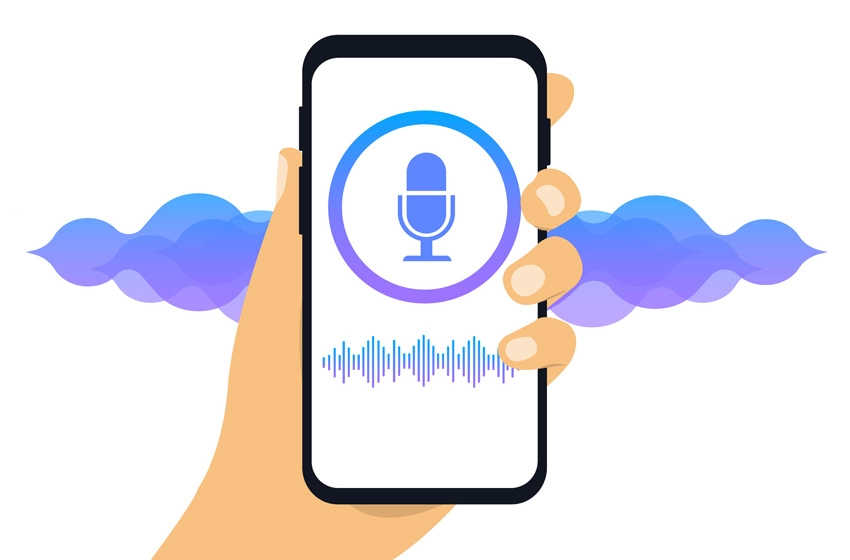The voice recognition market will reach over $27 billion by 2026 (Statista)
The way we look for information is currently going through a tectonic shift.
Now we no longer wait to type it out. Instead questions are verbally spelled out and responses are expected in no time.
It’s true. More and more people are switching over to voice searches instead of typing out their queries.
Ever wondered why the change of heart?
Not one but three major factors are the root cause of this new trend:
1. Voice search moves more quickly than typing.

Here, speed takes the cake home, pushing written searches to the back burner.
It is found that voice searches produce faster results than typing, tipping the scales in the favour of the former.
According to a Backlinko research, a voice search loads a results page in 4.6 seconds, but a typical written search takes 8.8 seconds.
That’s almost half the time taken.
Not only this, typing gets tedious especially when you’ve got a lot on your plate and things need to be done quickly and on large scale.
Thus, in case of a screaming to-do list, voice search comes as a handy tool that gets more done in less time.
For instance, if you are making a playlist of your favorite songs then instead of typing the details and lyrics of each song, it would be a much viable and convenient way to speak out the song using devices such as Alexa.
As a matter of fact, according to Oberlo, the top activities carried out using voice assistants are playing music (74%), checking the weather (66%), and setting alarms and reminders (58%).
Similarly, this approach can be adopted for shopping online on e-commerce platforms. By using voice search, you can comb the internet for products that you specifically need in no time.
Plus, you don’t typically need to pick up the gadget in your hands to converse on them.
Spatial proximity is not a necessity in voice search. You can pose your question to the blank wall, and answers will pop out of thin air.
That is why customers feel more at ease thanks to the touchless feature of voice search than they would with more traditional internet search alternatives.
Because it’s like talking to your own personal genie!
For example, voice search tools are especially helpful if you are driving since you may make purchases before you get at your location. While driving, you may effortlessly place orders without even using your hands.
Therefore, voice search is undoubtedly more practical since it enables multitasking, especially when individuals are engaged in other tasks and unable to completely utilize their hands.
A classic case of two birds with one stone!
2. Voice assistant replies have significantly improved since its inception:

According to PwC, more than 93% of users are happy with the precision and responsiveness of their voice assistants as a result of the advancement of voice search optimization.
Also, voice search is more inclusive and extensive in its audience reach owing to its multilingual accessibility, enabling marketers to spread their net wide and reach tier-II and tier-III target segments.
Nothing is lost in translation in the voice search technology as it is multilingual. The majority of the top languages are being supported by voice search apps being developed by many large mobile businesses.
Currently, Google Assistant can understand 30 main languages.
Not only this, to further broaden audience horizon and improve multilingual choices, new advancements are in progress.
So users are able to search for products in their native language in which they are most comfortable.
The voice-based technology does away cultural blocks, enabling marketers to corner markets without any linguistic constraints coming in the way of business communication.
Not only this, for many senior persons who struggle with hand dexterity due to ageing, voice search tools are a godsend. Senior adults may use this function and several internet amenities with ease.
Similar to this, illiterate people or those with partial impairments who find it uncomfortable to sit in a typing position can simply shout out their needs and receive results right away.
Since queries need not be put in black and white, searches become infinitely more efficient and accurate.
Therefore, it is crucial for companies to use a voice search application since it opens up their brand to a wider audience, including clients who previously couldn’t use digital marketing tools owing to numerous typing restrictions.
3. Voice assistants have risen above smartphones.

Microsoft reports that almost three-quarters of all U.S. households will eventually own at least one smart speaker.
That is why, a majority of businesses are now making themselves part of local SEO initiatives that target nearby clients.
It is possible to optimize local voice search to focus on particular services. By leveraging voice searches that match this type of term, one may improve one’s business significantly.
It has been found that most mobile voice search users look for very local terms.
As a result, it is crucial to optimize SEO for “near me” queries.
Trends are showing that company are getting incredible traction and spotlight by putting this localized voice search feature into practice.
If customers are pleased with the results of their voice search, users of any product or service will undoubtedly open a website to view the product specifics.
If the particular business carefully optimized their website for voice search, they will be able to draw in more visitors than they did previously and expose it to more customers.
This way, businesses can singularly bag customers in their immediate vicinity and leverage distance to broaden its audience reach and popularity.
For this reason, it is a good idea to take voice search into account for Frequently Answered Questions (FAQ) pages in which long-tail keywords can be stuffed in so appropriate responses can be created in a conversational style.
This, in extension, can turn out to be a huge customer magnet as the approach increases the probability of the business to rank in results when the customers happen to utter the selfsame keywords and localized lingo in their search queries.
Thus, if you have not optimized your website for voice searches yet, this is the time to fix it.
The winds have started to blow in the other direction and now, without a doubt, voice search is the FUTURE.

